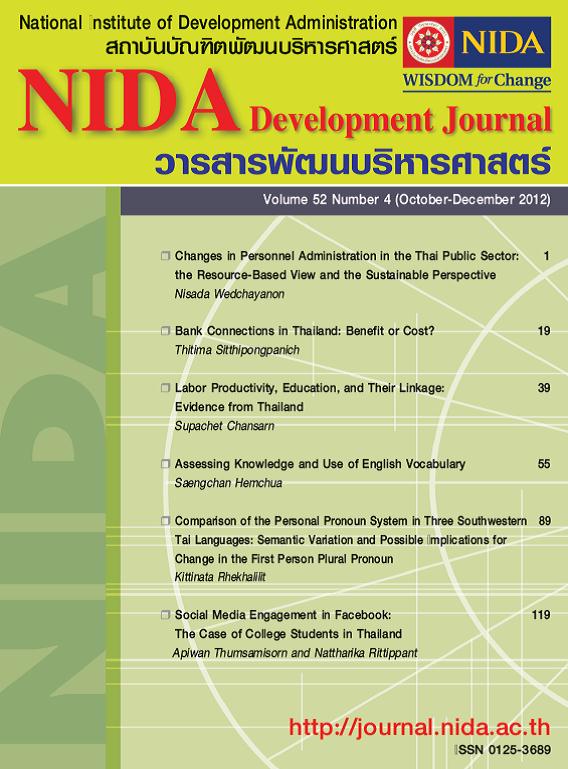Labor Productivity, Education, and Their Linkage: Evidence from Thailand
Keywords:
Labor Productivity, Education, Years of Schooling, ThailandAbstract
Abstract
This study aims to examine labor productivity growth and educational attainment, as measured by mean years of schooling, of employed persons in Thailand during 2001 – 2010. In addition, it investigates the influence of educational attainment on labor productivity growth in Thailand by employing multiple regression analysis. The findings reveal that employed persons in Thailand, on average, had only 6.88 years of schooling in 2010, implying that most of them completed only primary school. Fortunately, the mean years of schooling of employed persons in Thailand clearly exhibited an upward trend during the study period. In terms of labor productivity, I found that Thailand’s labor productivity constantly increased over the study period but exhibited high volatility in its growth rate. The industrial sector exhibited the highest labor productivity growth, followed by the agricultural and service sectors. Additionally, educational attainment was a vital determinant of labor productivity growth in Thailand because the findings reveal that employed persons will be more productive as they receive more education. However, we found that Thailand’s educational system has failed to create human resources that are suitable for every sector.
บทคัดย่อ
งานวิจัยเรื่องนี้มีวัตถุประสงค์เพื่อศึกษาการเจริญเติบโตของผลิตภาพแรงงานและระดับการศึกษาซึ่งวัดโดยจำนวนปีเฉลี่ยที่ได้รับการศึกษาของแรงงานในประเทศไทย ระหว่างปี พ.ศ. 2544 – 2553 นอกจากนี้ยังมีวัตถุประสงค์เพื่อศึกษาอิทธิพลของระดับการศึกษาที่มีต่อการเจริญเติบโตของผลิตภาพแรงงานในประเทศไทยโดยอาศัยการวิเคราะห์การถดถอยพหุคูณอีกด้วย จากการศึกษาพบว่า ในปี พ.ศ. 2553 แรงงานในประเทศไทยมีจำนวนปีเฉลี่ยที่ได้รับการศึกษาเพียง 6.88 ปี นั่นคือมีการศึกษาเพียงระดับประถมศึกษาเท่านั้น อย่างไรก็ตาม พบว่าจำนวนปีเฉลี่ยที่ได้รับการศึกษาของแรงงานในประเทศไทยมีแนวโน้มสูงขึ้นอย่างต่อเนื่องตลอดระยะเวลาที่ทำการศึกษา เมื่อพิจารณาผลิตภาพแรงงาน พบว่าผลิตภาพแรงงานของประเทศไทยเพิ่มสูงขึ้นอย่างต่อเนื่องตลอดระยะเวลาที่ทำการศึกษา อย่างไรก็ตาม พบว่าอัตราการเจริญเติบโตของผลิตภาพแรงงานมีความผันผวนเป็นอย่างมาก โดยภาคอุตสาหกรรมมีการเจริญเติบโตของผลิตภาพแรงงานสูงที่สุด ตามด้วยภาคเกษตรกรรมและภาคบริการ ตามลำดับ นอกจากนี้ยังพบว่า ระดับการศึกษาเป็นปัจจัยสำคัญที่กำหนดการเจริญเติบโตของผลิตภาพแรงงานของประเทศไทย สะท้อนให้เห็นว่าระบบการศึกษาไทยมีคุณภาพสูงเ นื่องจากแรงงานมีแนวโน้มที่จะมีผลิตภาพสูงขึ้นเมื่อได้รับการศึกษาสูงขึ้น อย่างไรก็ตาม พบว่าระบบการศึกษาไทยยังไม่สามารถสร้างทรัพยากรมนุษย์ที่เหมาะสมกับทุกภาคการผลิตได้





